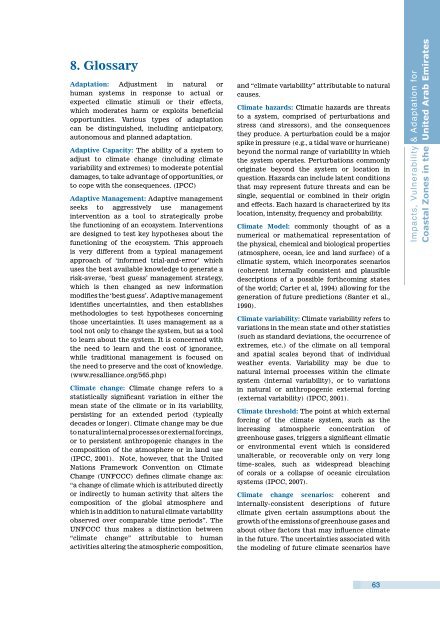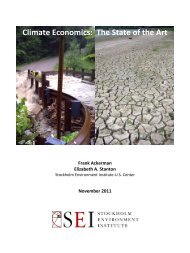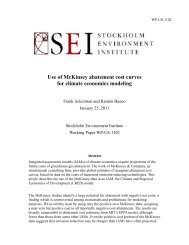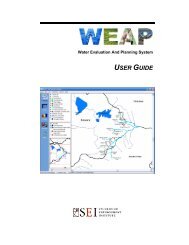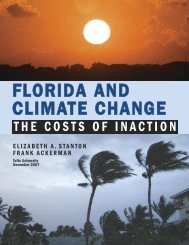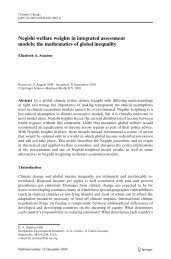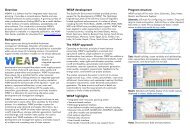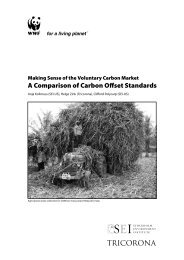climate change on UAE - Stockholm Environment Institute-US Center
climate change on UAE - Stockholm Environment Institute-US Center
climate change on UAE - Stockholm Environment Institute-US Center
You also want an ePaper? Increase the reach of your titles
YUMPU automatically turns print PDFs into web optimized ePapers that Google loves.
8. Glossary<br />
Adaptati<strong>on</strong>: Adjustment in natural or<br />
human systems in resp<strong>on</strong>se to actual or<br />
expected climatic stimuli or their effects,<br />
which moderates harm or exploits beneficial<br />
opportunities. Various types of adaptati<strong>on</strong><br />
can be distinguished, including anticipatory,<br />
aut<strong>on</strong>omous and planned adaptati<strong>on</strong>.<br />
Adaptive Capacity: The ability of a system to<br />
adjust to <str<strong>on</strong>g>climate</str<strong>on</strong>g> <str<strong>on</strong>g>change</str<strong>on</strong>g> (including <str<strong>on</strong>g>climate</str<strong>on</strong>g><br />
variability and extremes) to moderate potential<br />
damages, to take advantage of opportunities, or<br />
to cope with the c<strong>on</strong>sequences. (IPCC)<br />
Adaptive Management: Adaptive management<br />
seeks to aggressively use management<br />
interventi<strong>on</strong> as a tool to strategically probe<br />
the functi<strong>on</strong>ing of an ecosystem. Interventi<strong>on</strong>s<br />
are designed to test key hypotheses about the<br />
functi<strong>on</strong>ing of the ecosystem. This approach<br />
is very different from a typical management<br />
approach of ‘informed trial-and-error’ which<br />
uses the best available knowledge to generate a<br />
risk-averse, ‘best guess’ management strategy,<br />
which is then <str<strong>on</strong>g>change</str<strong>on</strong>g>d as new informati<strong>on</strong><br />
modifies the ‘best guess’. Adaptive management<br />
identifies uncertainties, and then establishes<br />
methodologies to test hypotheses c<strong>on</strong>cerning<br />
those uncertainties. It uses management as a<br />
tool not <strong>on</strong>ly to <str<strong>on</strong>g>change</str<strong>on</strong>g> the system, but as a tool<br />
to learn about the system. It is c<strong>on</strong>cerned with<br />
the need to learn and the cost of ignorance,<br />
while traditi<strong>on</strong>al management is focused <strong>on</strong><br />
the need to preserve and the cost of knowledge.<br />
(www.resalliance.org/565.php)<br />
Climate <str<strong>on</strong>g>change</str<strong>on</strong>g>: Climate <str<strong>on</strong>g>change</str<strong>on</strong>g> refers to a<br />
statistically significant variati<strong>on</strong> in either the<br />
mean state of the <str<strong>on</strong>g>climate</str<strong>on</strong>g> or in its variability,<br />
persisting for an extended period (typically<br />
decades or l<strong>on</strong>ger). Climate <str<strong>on</strong>g>change</str<strong>on</strong>g> may be due<br />
to natural internal processes or external forcings,<br />
or to persistent anthropogenic <str<strong>on</strong>g>change</str<strong>on</strong>g>s in the<br />
compositi<strong>on</strong> of the atmosphere or in land use<br />
(IPCC, 2001). Note, however, that the United<br />
Nati<strong>on</strong>s Framework C<strong>on</strong>venti<strong>on</strong> <strong>on</strong> Climate<br />
Change (UNFCCC) defines <str<strong>on</strong>g>climate</str<strong>on</strong>g> <str<strong>on</strong>g>change</str<strong>on</strong>g> as:<br />
“a <str<strong>on</strong>g>change</str<strong>on</strong>g> of <str<strong>on</strong>g>climate</str<strong>on</strong>g> which is attributed directly<br />
or indirectly to human activity that alters the<br />
compositi<strong>on</strong> of the global atmosphere and<br />
which is in additi<strong>on</strong> to natural <str<strong>on</strong>g>climate</str<strong>on</strong>g> variability<br />
observed over comparable time periods”. The<br />
UNFCCC thus makes a distincti<strong>on</strong> between<br />
“<str<strong>on</strong>g>climate</str<strong>on</strong>g> <str<strong>on</strong>g>change</str<strong>on</strong>g>” attributable to human<br />
activities altering the atmospheric compositi<strong>on</strong>,<br />
and “<str<strong>on</strong>g>climate</str<strong>on</strong>g> variability” attributable to natural<br />
causes.<br />
Climate hazards: Climatic hazards are threats<br />
to a system, comprised of perturbati<strong>on</strong>s and<br />
stress (and stressors), and the c<strong>on</strong>sequences<br />
they produce. A perturbati<strong>on</strong> could be a major<br />
spike in pressure (e.g., a tidal wave or hurricane)<br />
bey<strong>on</strong>d the normal range of variability in which<br />
the system operates. Perturbati<strong>on</strong>s comm<strong>on</strong>ly<br />
originate bey<strong>on</strong>d the system or locati<strong>on</strong> in<br />
questi<strong>on</strong>. Hazards can include latent c<strong>on</strong>diti<strong>on</strong>s<br />
that may represent future threats and can be<br />
single, sequential or combined in their origin<br />
and effects. Each hazard is characterized by its<br />
locati<strong>on</strong>, intensity, frequency and probability.<br />
Climate Model: comm<strong>on</strong>ly thought of as a<br />
numerical or mathematical representati<strong>on</strong> of<br />
the physical, chemical and biological properties<br />
(atmosphere, ocean, ice and land surface) of a<br />
climatic system, which incorporates scenarios<br />
(coherent internally c<strong>on</strong>sistent and plausible<br />
descripti<strong>on</strong>s of a possible forthcoming states<br />
of the world; Carter et al, 1994) allowing for the<br />
generati<strong>on</strong> of future predicti<strong>on</strong>s (Santer et al.,<br />
1990).<br />
Climate variability: Climate variability refers to<br />
variati<strong>on</strong>s in the mean state and other statistics<br />
(such as standard deviati<strong>on</strong>s, the occurrence of<br />
extremes, etc.) of the <str<strong>on</strong>g>climate</str<strong>on</strong>g> <strong>on</strong> all temporal<br />
and spatial scales bey<strong>on</strong>d that of individual<br />
weather events. Variability may be due to<br />
natural internal processes within the <str<strong>on</strong>g>climate</str<strong>on</strong>g><br />
system (internal variability), or to variati<strong>on</strong>s<br />
in natural or anthropogenic external forcing<br />
(external variability) (IPCC, 2001).<br />
Climate threshold: The point at which external<br />
forcing of the <str<strong>on</strong>g>climate</str<strong>on</strong>g> system, such as the<br />
increasing atmospheric c<strong>on</strong>centrati<strong>on</strong> of<br />
greenhouse gases, triggers a significant climatic<br />
or envir<strong>on</strong>mental event which is c<strong>on</strong>sidered<br />
unalterable, or recoverable <strong>on</strong>ly <strong>on</strong> very l<strong>on</strong>g<br />
time-scales, such as widespread bleaching<br />
of corals or a collapse of oceanic circulati<strong>on</strong><br />
systems (IPCC, 2007).<br />
Climate <str<strong>on</strong>g>change</str<strong>on</strong>g> scenarios: coherent and<br />
internally-c<strong>on</strong>sistent descripti<strong>on</strong>s of future<br />
<str<strong>on</strong>g>climate</str<strong>on</strong>g> given certain assumpti<strong>on</strong>s about the<br />
growth of the emissi<strong>on</strong>s of greenhouse gases and<br />
about other factors that may influence <str<strong>on</strong>g>climate</str<strong>on</strong>g><br />
in the future. The uncertainties associated with<br />
the modeling of future <str<strong>on</strong>g>climate</str<strong>on</strong>g> scenarios have<br />
Impacts, Vulnerability & Adaptati<strong>on</strong> for<br />
Coastal Z<strong>on</strong>es in the United Arab Emirates<br />
63


